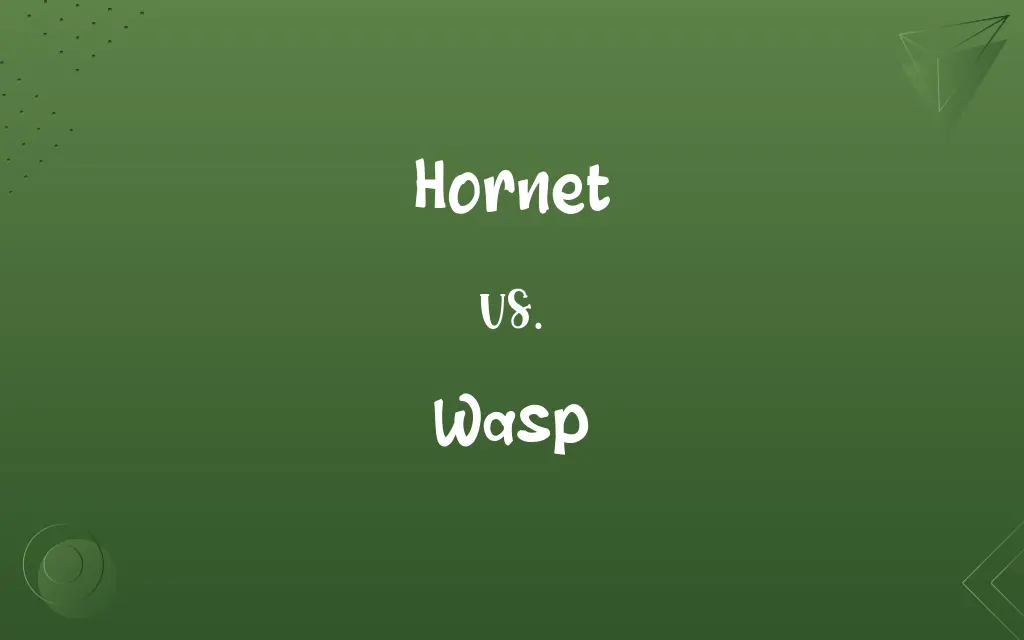Hornet vs. Wasp: Know the Difference

By Shumaila Saeed || Updated on December 25, 2023
Hornets are larger, less aggressive types of wasps, often with more painful stings, while wasps are a broader group with varied sizes and behaviors.

Key Differences
Hornets are a subset of wasps, generally larger and bulkier. Wasps, on the other hand, can range widely in size, with some species being quite slender.
Shumaila Saeed
Nov 16, 2023
Hornets are known to be less aggressive than many wasp species unless provoked. Wasps, including hornets, display varied behaviors, but some can be more aggressive, especially when their nest is threatened.
Shumaila Saeed
Nov 16, 2023
Hornets often build large, enclosed nests in trees or shrubs. Wasps have diverse nesting habits, with some species building paper nests and others burrowing underground.
Shumaila Saeed
Nov 16, 2023
Hornets primarily feed on other insects and sometimes on plant substances. Wasps have a more varied diet, including nectar, insects, and even human food.
Shumaila Saeed
Nov 16, 2023
Hornets can sting multiple times, and their stings are often more painful due to larger amounts of venom. Wasps, including hornets, have stingers for defense and hunting, but their sting potency varies by species.
Shumaila Saeed
Nov 16, 2023
ADVERTISEMENT
Comparison Chart
Aggressiveness
Less aggressive unless provoked
Varies, some species more aggressive
Shumaila Saeed
Nov 16, 2023
Nesting Habits
Large, enclosed nests in trees or shrubs
Diverse, from paper nests to burrows
Shumaila Saeed
Nov 16, 2023
Diet
Predominantly other insects and plants
More varied, including nectar and human food
Shumaila Saeed
Nov 16, 2023
Sting Potency
More painful, larger venom quantity
Varies, some less potent than hornets
Shumaila Saeed
Nov 16, 2023
ADVERTISEMENT
Hornet and Wasp Definitions
Hornet
Hornets often feed on other insects.
Hornets play a role in controlling pest populations in gardens.
Shumaila Saeed
Nov 16, 2023
Wasp
Wasps are known for their diverse nesting habits.
The wasp built its nest under the eaves of the house.
Shumaila Saeed
Nov 16, 2023
Hornet
A large, stinging wasp of the genus Vespa, with a powerful sting.
The gardener was careful to avoid disturbing the hornet's nest in the tree.
Shumaila Saeed
Nov 16, 2023
Wasp
Wasps vary in color, often with yellow and black patterns.
The black and yellow wasp landed on the flower, searching for nectar.
Shumaila Saeed
Nov 16, 2023
Hornet
Hornets are known for their sizable, football-shaped nests.
Hikers spotted an impressive hornet nest hanging from a high branch.
Shumaila Saeed
Nov 16, 2023
ADVERTISEMENT
Wasp
A type of insect that can be either social or solitary.
Unlike bees, some wasp species live solitary lives.
Shumaila Saeed
Nov 16, 2023
Hornet
A type of social insect, living in large colonies.
A colony of hornets can aggressively defend their nest against intruders.
Shumaila Saeed
Nov 16, 2023
Wasp
Wasps play a role in pollination and pest control.
The garden benefited from the wasps pollinating flowers and eating aphids.
Shumaila Saeed
Nov 16, 2023
Hornet
Any of various large stinging wasps of the family Vespidae, chiefly of the genera Vespa and Vespula, that characteristically build large papery nests.
Shumaila Saeed
Oct 19, 2023
Wasp
A white person of Protestant English or other Northern European ancestry, especially one belonging to the American upper class.
Shumaila Saeed
Oct 19, 2023
Hornet
A large wasp, of the genus Vespa, having a brown-and-yellow-striped body and the ability to inflict a serious sting.
Shumaila Saeed
Oct 19, 2023
Wasp
A member of Women's Airforce Service Pilots, organized during World War II as part of the US Army Air Forces to ferry aircraft and to test new aircraft. The organization was disbanded in 1944.
Shumaila Saeed
Oct 19, 2023
Wasp
Any of numerous social or solitary hymenopterans of the suborder Apocrita, especially of the family Vespidae, that characteristically have a slender hairless body with a constricted abdomen, two pairs of membranous wings, a mouth adapted for biting or sucking, and in the females an ovipositor sometimes modified as a sting.
Shumaila Saeed
Oct 19, 2023
Hornet
A large, strong wasp. The European species (Vespa crabro) is of a dark brown and yellow color. It is very pugnacious, and its sting is very severe. Its nest is constructed of a paperlike material, and the layers of comb are hung together by columns. The American white-faced hornet (Vespa maculata) is larger and has similar habits.
Shumaila Saeed
Oct 19, 2023
Wasp
(entomology) Any of the members of suborder Apocrita, excepting the ants (family Formicidae) and bees (clade Anthophila).
Shumaila Saeed
Oct 19, 2023
Hornet
Recognizable by their robust bodies and large size.
The hornet buzzed loudly, its large body casting a shadow on the picnic table.
Shumaila Saeed
Nov 16, 2023
Wasp
Any one of numerous species of stinging hymenopterous insects, esp. any of the numerous species of the genus Vespa, which includes the true, or social, wasps, some of which are called yellow jackets.
Shumaila Saeed
Oct 19, 2023
Wasp
A white person of Anglo-Saxon ancestry who belongs to a Protestant denomination
Shumaila Saeed
Oct 19, 2023
Wasp
Social or solitary hymenopterans typically having a slender body with the abdomen attached by a narrow stalk and having a formidable sting
Shumaila Saeed
Oct 19, 2023
Wasp
A narrow-waisted insect with a sting, belonging to the order Hymenoptera.
She carefully removed the wasp from her room without harming it.
Shumaila Saeed
Nov 16, 2023
Repeatedly Asked Queries
Are all wasps aggressive?
Not all wasps are aggressive; their behavior varies by species.
Shumaila Saeed
Nov 16, 2023
What is a hornet?
A hornet is a type of large wasp, known for its size and powerful sting.
Shumaila Saeed
Nov 16, 2023
Are hornet stings dangerous?
Hornet stings can be painful and dangerous to those allergic to their venom.
Shumaila Saeed
Nov 16, 2023
What do hornets eat?
Hornets primarily eat other insects and sometimes plant substances.
Shumaila Saeed
Nov 16, 2023
How can I identify a wasp?
Wasps can be identified by their narrow waists and often have yellow and black patterns.
Shumaila Saeed
Nov 16, 2023
How does a wasp differ from a hornet?
Wasps are a broader group including many species, while hornets are a specific type of large, less aggressive wasp.
Shumaila Saeed
Nov 16, 2023
Can hornets sting multiple times?
Yes, hornets can sting repeatedly without losing their stingers.
Shumaila Saeed
Nov 16, 2023
Do wasps play a role in the ecosystem?
Yes, wasps contribute to pollination and pest control.
Shumaila Saeed
Nov 16, 2023
What is the lifespan of a wasp?
The lifespan of a wasp varies, but most live for several months.
Shumaila Saeed
Nov 16, 2023
Do hornets have natural predators?
Yes, birds, bats, and other insects can prey on hornets.
Shumaila Saeed
Nov 16, 2023
Can hornets be found in urban areas?
Hornets can be found in both rural and urban areas, often where there are trees and shrubs.
Shumaila Saeed
Nov 16, 2023
What time of year are wasps most active?
Wasps are most active in warmer months, usually in spring and summer.
Shumaila Saeed
Nov 16, 2023
Do hornets hibernate?
Queen hornets hibernate during winter, while the rest of the colony dies off.
Shumaila Saeed
Nov 16, 2023
Where do hornets build their nests?
Hornets typically build large, enclosed nests in trees or shrubs.
Shumaila Saeed
Nov 16, 2023
Can wasps be beneficial to gardens?
Yes, wasps can benefit gardens by controlling pests and pollinating plants.
Shumaila Saeed
Nov 16, 2023
How do hornets communicate?
Hornets communicate through pheromones, visual signals, and vibrations.
Shumaila Saeed
Nov 16, 2023
What differentiates wasp species from each other?
Wasp species vary in size, color, nesting habits, and behavior.
Shumaila Saeed
Nov 16, 2023
Are hornet nests dangerous to humans?
Disturbing a hornet nest can be dangerous due to their defensive behavior.
Shumaila Saeed
Nov 16, 2023
How do wasps contribute to biodiversity?
Wasps contribute to biodiversity through their roles in ecosystems as predators and pollinators.
Shumaila Saeed
Nov 16, 2023
Are wasps attracted to human food?
Some wasp species are attracted to human food, particularly sweets and proteins.
Shumaila Saeed
Nov 16, 2023
Share this page
Link for your blog / website
HTML
Link to share via messenger
About Author
Written by
Shumaila SaeedShumaila Saeed, an expert content creator with 6 years of experience, specializes in distilling complex topics into easily digestible comparisons, shining a light on the nuances that both inform and educate readers with clarity and accuracy.








































































